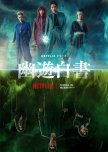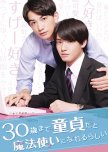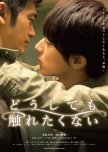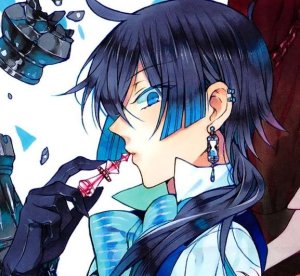
I have mixed feelings towards the movie, in comparison to the show.
I DID enjoy it, don't get me wrong, it's a good movie, the acting is great, and it carries on with the spirit of the show and the essence of what made it great: the cozy-ness, the amazing cooking, the genuine portrayal of a relationship of two men in their 40s in a country that doesn't recognize their partnership legally, the navigating said relationship with family, workplace and society as a whole.
The movie does add a bit more on the personal feelings of both characters, with a situation that generates a parallel for both in different points of the movie.
And when I say "a bit" I mean...a tiny bit. I am disappointed in the fact that I don't think they took it far enough for a movie.
It felt like a long episode of the show and, to be honest, when you have the opportunity of a movie, I think your storytelling possibilities expand in other directions that I don't feel they took. Ossan's Love, for example, isn't as good as this show when it comes to taking things seriously (and the acting isn't as good as this, in general), but they did use their movie to give a step forward that allowed them to pull off a better season 2.
I feel like they didn't go as far as they could have with the movie, in terms of using the vehicle to give a much deeper glimpse into one of their conflicts, picking just one to explore and going all for it. The movie has a sort of array of situations that get developed somewhat, rather than one that can get fully expanded.
I say this also because, since watching season one, I was able to read some of the manga and I feel like the manga gets more intimate with Kenji's and Shiro's relationship in some levels that we don't get in live action form. And, when I say "intimate", I mean communication wise, not necessarily just physically. I feel like there's a lot of deep emotional exploration that gets somewhat cut short by the fact that they move on to the next issue before delving deeper into the prior one, and the movie format could have allowed them to have the space that a series format may not allow for them to do just that.
All in all, it's a lovely movie and I'm happy to see more of this show coming out. I have high hopes for the second season that I've already started. I just wish the movie could have given a step forward in development, but I don't think this was quite that.
Was this review helpful to you?

Ossan's Love Returns Spin-off Drama: Haruta to Maki no Shinkon Shoya
1 people found this review helpful
There are two side stories/special shorts (labeled here as “spin offs”) of Returns. One of them (Forbidden Gout Temps Nouveau) consists of two episodes and can be found in some places labeled as 9.1 and 9.2. This one (Haruta to Maki no Shinkon Shoya) is only one episode and can be sometimes found as a “special clip”.
This episode is approximately 10 minutes long and it’s a segment on Maki and Haruta reuniting and Maki coming to their new home for the first time. It can be watched after the series (that’s what I did) but, differently from the other spin off, I think it would have been ideal to watch it after episode 1 of the Returns season. It takes place after Maki returns and before they decide to call for a housekeeper (like, 9 minutes into episode 1?).
Some of the things that show up and are discussed in this special are mentioned or show up during the main season (the chores distribution, Maki not wanting to have home parties, Haruta wanting to have more dates, etc.). They also provide some small but actually interesting context of timeline regarding the previous installments, on how long it’s been since they’ve seen each other and why, having a long distance relationship, how Haruta got the house and why he got a house instead of an apartment…Honestly, there was more information than I expected for a short domestic 10 minute fluff, information I kind of wish I had while watching the season.
It’s not going to make or break the season experience not to watch it, but who would have thought so much interesting context could be packed in a 10 minute short of these two being flirty with each other. I hope this helps clarify the situation for those who might have been as lost as I was. I'm leaving the description of the other spin off in its own review.
Was this review helpful to you?

Ossan's Love Returns Telasa Spin Off: Forbidden Gout Temps Nouveau
1 people found this review helpful
This review may contain spoilers
I've already posted a lengthy review on OL Returns with my feelings on the overall season, so this is going to be just a note for those trying to figure out what's going on with the spin off/side-stories situation. There are two side stories/special shorts (labeled here as “spin offs”) of Returns. One of them (this one: Forbidden Gout Temps Nouveau) consists of two episodes and can be found in some places labeled as 9.1 and 9.2. The other one (Haruta to Maki no Shinkon Shoya) is only one episode and can be sometimes found as a “special clip”.
This particular spin off (both of these episodes) should probably be watched after the season, to avoid spoilers. If you haven’t watched the series, read with caution the summary, or leave it for after you’ve watched the season to make sure you’ve got the right episodes. The two episodes of this spin off are:
1. One in which Takegawa calls Maki and Haruta on their day off to help with a last minute work issue that Izumi messed up with. Maro is also called. It seems to be set somewhere in the middle of Returns, definitely after episode 6 but before episode 9.
It’s centered on them talking about dates they’ve had: Maki and Haruta mention the double date that is referenced in the main series with Haruta’s mom and her boyfriend, Maro talks about Choko and him going on a date after the wedding, Takegawa talks about Shigen without them yet knowing who he means and Izumi talks about Akito. There are flashbacks included.
This episode is approximately 20 minutes long.
2. One in which Maki and Haruta invite Takegawa, Maro and Izumi over for a hot pot meal. It seems to be placed directly after Maki and Haruta have to take care of Goro, so somewhere around episode 7 of Returns.
They talk about some of the things that happened in the wedding, Izumi explains what he meant when he mistook Haruta and Akito for the first time, Maro does a party trick that goes wrong. They also reference and there is a resolution to a sort-of-argument Haruta and Maki had about who fell for the other first.
This episode is approximately 16 minutes long.
Both of these start and end with Maki and Haruta being domestic and soft. I hope that helps clear out some stuff for those who might be as confused as I was! I’ll leave the explanation of the other spin off to the review section of that one.
Was this review helpful to you?

Ossan’s Love is a…particular case of a show. It depicts interesting and heartfelt topics but it is, in essence, a comedy at heart. With a specific brand of comedy that tends to be polarizing for jdrama enthusiasts.
Since its release (in 2016, but also its 2018 “first” season), OL depicted both a queer relationship (in the Haruta/Maki couple) and a caricature-style comedy of an older closeted gay man with histrionics, that could be hit or miss with the audience (the Kurosawa character). This duality had its pros and cons, it allowed them to explore an mlm relationship in a more mainstream-ish context for a show at the time, but it had the gimmick to make it all “not so serious” if they wanted to backpedal. It was what it was at the time and it served its purpose.
I don’t know if they ever envisioned OL hitting it off as it did, or the audience being as engaged with the relationship between Haruta and Maki as it was, but you can tell, through the development of the subsequent installments (of this narrative, let’s leave the au out of this) that they became more and more comfortable with the story they were showing and that the landscape of queer content in mainstream media was allowing for more than just comedy bits.
This season, more than any other installment, allowed Maki and Haruta to deal with what it means for them, as a gay couple in a country in which same sex marriage isn’t legalized, to become a family.
Instead of having a season-long conflict to deal with throughout, the plot allows them to deal with different situations alongside the season, which all together help develop not only their relationship as a “married” couple, but also them individually as adults.
I think that the strength of Haruta as a main character, which also allowed OL to stand out from other BL dramas (and jdramas with lgbtq+ content in general), is that he is the protagonist of a coming-of-age story in your 30s, questioning sexuality included. Which, with the social, political and cultural landscape we live in, is incredibly necessary imo.
Haruta’s heartfelt nature and genuine love for what he does is explored this season without him becoming the butt of a joke and his development is, I think, more evident than before. At the same time, Maki’s character shows some cracks in his seemingly perfect disposition and is shown to be more vulnerable and open to learning.
This season brings back characters from season 1, some which were missing from the movie. I should mention that the movie was not referenced at all, not even the characters introduced in it, but I do consider it a stepping-stone into what this season would become narratively.
All of the storylines with the characters from the previous season give something to the main narrative of Haruta’s growth and his and Maki’s relationship. I’ll give a special mention to Chizu who is back and better than ever, now a single mother with a corporate job. Takegawa has probably the messiest storyline and I feared they’d make him a second version of Kurosawa, but they kept it mostly in line.
Kurosawa this season is…less annoying. He’s still comedy relief and still histrionic but his relationship with Haruta and Maki develops in a healthier way (for the most part), until it sort of finds a space. I’m still not totally sure about him, but he was much improved from season 1 and it showed that they were trying to make him evolve and become more than a cartoon-ish character.
The one thing I didn’t like much from the season was the new characters’ narrative. They introduce a new couple of characters (much like they did in the movie, but this time the two characters know each other) with a storyline that I didn’t think fit well in the season.
Don’t get me wrong, adding Miura Shohei and Iura Arata is going to lift the acting bar and it showed, but the tone of their storyline and the way they got involved with the characters we already knew was…somewhat forced for no reason. And, at the end of the day, I’m not sure their inclusion added anything narratively, even if it did in the level of acting.
The tone of what they were serving didn’t match the tone that we had going on, and this show already has a complicated tone to begin with.
At times, the editing and the known histrionics of the show were a bit chaotic but I feel it’s noticeable how they worked hard to try to maintain the identity of the show while not getting stuck in the gimmick or the superficial caricature. Taking into consideration that the writing and directing team was the same, I genuinely think that, with this season, they’ve proven to be more invested in representing a genuine relationship and for the comedy identity of the show not to take away from the subjects introduced and developed. I’m very genuinely pleased with that.
I feel like the show evolved and grew into something more committed to itself.
Watching Haruta and Maki figure out their lives together, what it means for them to be married, how to balance their personalities, talking to each other’s parents, where they set boundaries, what they want from a family together…it all felt very heartwarming and domestic, like they had picked a page from the Kinou Nani Tabeta? book. I feel like the season rewarded the audience with an insanely good level of Communication between these two after all we went through in the previous installments. The way they talk about things and trust each other is *chef's kiss*.
As an added note, we got a cameo from Fujioka Dean (!!!) and from the two protagonists of the Thai drama Moonlight Chicken playing their characters from that show, since those same actors will portray Haruta and Maki in the Thai version of OL. We have a budget this time, fam!
When I finished my OL movie review I said: “If they want a series 3, or another instance of this, they better continue where this left off and ditch the AU ideas, because this is where it’s at”. I am pleased to say that they listened, delivered and I couldn’t be happier.
I don’t know if there’s more OL on the horizon (that last episode felt a bit like a farewell, I’m not sure) but with the trajectory this is taking, I’ll be there to watch it if there is.
Was this review helpful to you?

Here's the thing about this one: it's way too good for them to have adapted just this small portion of it and, with the script adaptation they had, they wrote themselves into a corner if they were interested to continue it.
The cast is sublime. I was expecting stellar work from Shison Jun (who you may recognize from other manga adaptations like Tricornered Window and that one shojo about a toxic monk) and Hongo Kanata (who you may recognize from other manga adaptations like The Prince of Tennis and GOTH) but Kitamura Takumi as Yusuke, Uesugi Shusei as Kuwabara, Furukawa Kotone as Botan and Shiraishi Sei as Keiko were all *chef's kiss*.
I don't think I can totally convey how very "Yusuke" Kitamura Takumi was. The facial expressions, the body language, the tone of voice. This guy got the assignment 100%. They all did.
The fight choreography was amazing, they all look so grounded and real, which is key for a shonen like Yu Yu Hakusho, in which battles are more rooted in the street fight and less on the grand effects (which we also get here, don't get me wrong).
They also did a great job with costume and make up, with added details in the classic outfits of characters like Kurama, Hiei and Yukina (the embroidery???).
The problem is that, with all the amazing ingredients they had, they still didn't have the confidence to pull a script that would allow them to continue this organically if they wanted.
Yu Yu Hakusho has four main arcs, the first one being the introduction to the world and Yusuke's detective work, the second one being the best arc in the manga/anime (and one of the best in manga/anime history maybe? am I exaggerating?): The Dark Tournament. For the Tournament to have the gravitas that it did, it required a lot of world and character building, introducing the human world and the demon world to then combine them together in this epic scenario.
This adaption merged the first and second arcs, getting rid of the Tournament setting and introducing The Big Bads of that arc in this one. They used pristine ingredients to cook only a snack.
This is not the first time (and probably won't be the last) in which an anime/manga adaptation blows the storyline in a first part, having to attempt to mend the pieces as best as possible in later adaptations, once they figure out it was a good idea to make more. Fullmetal Alchemist is a great example of that, with a first movie that changed a lot of the plot and having to fix it in the next two films, which thankfully were much better.
With this, though, it's very difficult to know how they could save it if they wanted. In order to do the Dark Tournament they'd have to change the characters they're going against or pull some writing gymnastics to justify it. And making another season with the third arc, Sensui's arc, wouldn't be at all impossible but it'd feel like we're missing the best part of Yu Yu.
I'm also not sure if there was enough room for this introduction to convey all that it had the potential to show to an audience that's unfamiliar with the source material. I think it will be entertaining and engaging to newcomers, it will most definitely interest them to know what happens to these characters next, but it would have probably been a lot more certain had they had the time to develop it more, like the anime/manga did.
All in all, it's a great adaptation, but it's disappointing that they squandered it in such few episodes, attempting to cram so much of the plot in them. If these 5 episodes would have been just the introduction of the world and characters, before the Tournament, it would have left the door clearly open for more, and I think audiences, fans and newcomers alike, would have wanted to see it. I hope they do make more, because this cast and director deserve it, but it's going to be a challenge to see how.
If I had any decision making power, though, I would also humbly request them to record the character songs because I feel they'd slay. Just saying.
Was this review helpful to you?

When I heard that Erika Yoshida, who had written one of my favorite aroace characters of all time (Nozomi Fujisaki in Cherry Magic) was writing a whole drama with two aroace leads, I was looking forward to it immensely. After actually watching it, this drama did not disappoint in the least.
It's difficult to find aromantic, asexual or aroace representation in media. It's even more difficult to find good representation. Furthermore, fanon never helps with it, given that it's more often to see characters that could be interpreted as aroace in canon shipped in fanon, as if it was always, unequivocally, a "problem to fix".
This drama doesn't give you one, it gives you two aroace characters who, upon talking about their experiences, decide to live together and figure out if a family born from a love that isn't romantic can withstand just as strongly, whether society around them likes it or not, understands it or not, sees it for what it is or not.
Having two characters that are so diametrically opposed in personality (Sakuko is easygoing, charismatic, doubtful and insecure; Satoru is introverted, quiet, confident and passionate about what he loves to do) and who experience their aroace-ness in different ways, coming from different histories with relationships, makes it incredibly rewarding and allows to portray their identities not as a set, unmovable label, but as complex experiences on a spectrum.
A very pleasant surprise for me was Kazu, a character I thought was going to become too pushy with his amatonormativity, but he became a great asset to not only showcase how people can adapt to understanding others but also, probably, allow those who don't know about the aroace experience to have someone to learn with.
The story isn't a thrilling, action-packed one. This is one of the domestic, day-to-day, cozy ones. Both Satoru and Sakuko deal with work, their life aspirations, societal expectations, family and friends; but the seriousness with which the drama takes the subject and the way in which it centers itself in the portrayal of aroace experiences, makes it more emotionally vulnerable than other domestic dramas, especially if you identify. Honestly, I wish this drama was more easily available with different language subtitles so I could watch it with people who may not understand. I think it'd be a fantastic way to help those around learn about things that I wish they understood.
If you're anywhere in the asexual, aromantic or aroace spectrum, do yourself a favor and look for this drama. There is little else out there that does such a good job and has such respect towards the subject. I can only hope Erika Yoshida continues to give us this rep, because she is great at it.
Was this review helpful to you?

The lives of Maikos and Geikos have often been represented by external gazes, and they were done wrong many times by international eyes who saw in them what they wanted to see rather than what was there. This drama has the ability to showcase a traditional practice in a day-to-day setting, letting us see the domesticity, the relatable bits, the inner story of a Maiko house.
This is less about painting a grandiose image and more about showcasing daily lives, with the core of the story being two friends from Aomori (Kiyo and Sumire) who decide to move at age 16 to become Maiko. However, and very early on, Kiyo finds herself in a different journey, the one that gives the title to the drama: she discovers the role of a Makanai, a cook who prepares home-made meals for those who work in the house (and maybe also, through that, provides unconditional love and support).
With a masterful grace similar to dramas like Kinou Nani Tabeta? and Shinya Shokudo (and, less successfully, others like Lunch no Akko-chan or Ando Natsu), this drama is successful in writing the complex through simplicity and narrate a compelling story (in this case, a coming of age story) in a setting that is inviting, welcoming and that has inspiring cooking scenes.
The relationship in the center is the friendship between Kiyo and Sumire, which is incredibly refreshing to see. I'm very thankful for dramas that have come out of late which allow for more than just romance in its core. Still, there are a lot of characters with their own journeys (successful Geikos with life crisis, retired ones who deal with balancing their blood family and their work family, old apprentices who struggle, new apprentices who also do, retired Geikos who come back, family members of people in the house who don't share the traditions, etc.).
The only critique I'd give is that some elements of narrative tension, some thing that seemed would go somewhere, didn't quite have the space to develop. I can only hope that this is like Shinya Shokudo and we get more of it, but only time and people's engagement will tell.
If you're looking for a fast-paced, action-packed, tragedy-filled drama, this one isn't it. But if you're looking for a relaxing, domestic, coming-of-age drama with traditional elements and amazing food, a drama that you can come home to, then give this one a chance.
Was this review helpful to you?

30-sai made Dotei Da to Mahotsukai ni Nareru rashii
0 people found this review helpful
More than meets the eye
I had 0 expectations with this one. The title isn't really helping and the premise is a bit...strange. However, I was, for the most part, pleasantly surprised.I don't know the manga this was based on, but this adaptation really smoothed a lot of edges of what "regular BL content" is mostly like. They took a story that could have been yet another one of those, and gave it a lot of heart, polishing some (not all) of the problematic aspects of storylines that play in the edge between representation and fanservice.
The main relationship is devoid of a lot of the toxic tropes you normally get, not only in BL content, but in romantic dramas in general. The premise of the lead being able to read thoughts makes it so that the situation could have gone into a serious dub-con territory and it never did. The relationship progresses in a natural, interesting way and the mind-reading assists in telling the story, rather than provoke unnecessary complications.
The absolute gem for me in this one was the first ever canon aroace character I've seen in a jdrama. I've found ace and aroace characters in manga before (few and far between) but this is the first time that, not only I see one in a jdrama, they are also confirmed by the writing team. I won't spoil which character this is, so I'll remain ambiguous with my description, but it's not one of the two mains, it's a side-character. Not only are they iconic, they're also depicted as loving, caring and a fantastic friend, and that's the kind of aroace representation I want.
My only issue with the drama was the side couple. It made me kinda uncomfortable, I'm not gonna lie. Minato (Goto Yutaro) looked incredibly young and Masato (Asaka Kodai) looked even older than he is. I'm glad Minato wasn't supposed to be a teen, and that at least the actor was older than he seemed, but I couldn't help feeling pretty uncomfortable with their development, especially since they had more physical scenes than the lead couple, albeit nothing major.
All in all, I wanted to leave a review because 1) I was super close to not watching this at all, based on the marketing and title and 2) it has an aroace character and pretty good handle of relationships, for the most part. I'm glad I gave it a chance.
Was this review helpful to you?

The best live action Tenipuri I've seen to date
I'm sure this review is unnecessary, considering this title came out a minute ago and my opinion isn't worth much but I'd be dishonoring my younger self if I didn't give credit where credit is due where a Prince of Tennis product is concerned.Like the title says, this might be my favorite live action adaptation of Prince of Tennis (without counting tenimyu, because that's another beast entirely). Hands down.
Even though the characters and teams were re-named (due to the switch of country), their personalities were fleshed out really well and the characterization was delivered with a lot more nuance than I had anticipated. The relationships between the characters was explored more than in other live action versions and they chose their focus well.
The age of the characters was increased, going from the original middle school age (which is whacky bananas at this point, Konomi, that 40-year-old-looking-man is not 14) to a more believable high school age, with actors over the age of 20. That worked, not only because it fits the target audience better, but also because they were able to go in depth with added conversations I was super impressed with.
My favorite, for example, was that they gave Oishi/DaYong a struggle with anxiety that made his fight with Eiji/Jiale a lot more intense when it happened and the match against this version's Hyotei a lot more meaningful. It works really well narratively-wise to deepen his journey as a vice captain, considering his abilities and the situation regarding Tezuka/SiYang's health, with something like that, and they handled it really well.
They also gave Sakuno/Qi Ying more room, as well as her relationship with Ryoma/Lu Xia, which gives the show a bit more of a romantic flare than the original, not enough to interrupt the tennis, but enough to sustain the show in a market of cdramas by its own.
The references to the original were everywhere (cakes with chibi versions of the characters included) and, despite the insatiable censorship, the tension between the characters that the anime loves to play with was there 100%, for whoever wants to know.
All in all, I hope with all my heart this gets another season and we can see them at Nationals because it's been a blast and there's still more Prince of Tennis to adapt with a cast as great as this one.
Was this review helpful to you?

3 Nen A Gumi: Ima kara Mina-san wa, Hitojichi Desu
0 people found this review helpful
Since this is a thriller-suspense in part, every episode has its plot twists and reveals, so I’m going to keep it as spoiler-free as possible, but even though I’ll remain vague to specifics, know that there’s little you can do spoiler-wise with this one if you want to have a fully-fleshed review.
I like to refer to this drama jokingly as “Gokusen with explosions”. Still, it actually blends three genres of drama, which don’t tend to mix well, and does so very seamlessly: high school drama, thriller and tokusatsu.
The entire plot is set on the thriller, it has a really good grasp of its narrative and it really immerses you in from episode one. Some reveals aren’t too unexpected, but that doesn’t really ruin the watching experience, since they’re thought through and well-written, for the most part.
The high school drama is a genre that I don’t tend to gravitate much towards unless there’s some catch, and this one has that. The development of the students and their issues is more into the realms of something like 12 Suicidal Children (albeit here it’s better written) than something like Dragon Zakura or Gokusen. Not every issue is developed as much as it could, but this drama takes its issues more seriously and with much more intensity than your typical high school drama would.
The tokusatsu aspect is used here as a sort of allegorical parallel that works super well. You end up finding out how it works and why it’s there as you go along with the plot, and to me it was a really fantastic addition. I am a sucker for well used archetypes and this drama really knew what it was doing.
Related to that, there are few actors that could have taken the lead as well as Suda Masaki did. I was initially reticent because I would have thought his character older, but he has the right experience in all the genres this drama is made out of (thriller? check, high school dramas with a twist? check, tokusatsu? double check) and it absolutely shows in his performance.
I have smaller nitpicks here and there with how some of the characters were handled and how some tropes were used but my biggest qualm with the drama is, like I said, that it sadly aged immensely in the past year since it’s been out.
Here I'll be delving into some mild spoilers, I wont specify how this comes into play but a subject matter present in the drama will be discussed.
One of the many things portrayed in this drama is related to cyber-bullying, social media and suicide. In the last months we’ve had more than one case of this happening in the Japanese media industry. More than one. Not an isolated event, this is a huge problem.
The drama uses that to bring across a discourse of responsibility and taking accountability for your actions, which is really good, and it does a good job using the theme of empathy and change. It does base its premise in maturing and learning while putting ourselves in the other person’s shoes. It has a good aim and a realistic approach in which solutions could be found in small personal changes.
However.
There is something that is mentioned, used and described in the drama that gets zero attention when it should be paramount in this sort of premise: mental health.
The drama uses mental illness in different important ways for the plot, and even though it showcases it and sets it as something important, it does not develop the lack of proper care of it and the lack of conversation about it as one of the key parts of society’s failure towards the subject matter discussed.
I know that in jdramas that doesn’t tend to be expected and that I have to put myself in the place of the social environment these dramas come from, but some things are not culturally specific, some things are universal, and mental health care should be.
Maybe last year, when the world was in a different place, it was easier for the regular audience to dismiss it and move along and just stay with the sometimes really shallow rant of “people+social media=bad”. Sadly, we should know better now, and this drama has aged faster than anyone expected.
If the drama had not mentioned it, had not even included it, I would have thought it an overlooked element but not been as disappointed, but it is a very important part of its plot for more than one character, and I can’t help thinking that it reflects the missing conversations that society should be having on the subject of mental health care and the neglect, shame and overall silence these themes are seen by in regular media.
The lack of proper attention to these subject matters and the absolute lack of accessibility to proper mental health care, not only out of money and means but out of a social stigma that prevents people from reaching out to professional help when needed, is a key element of this storyline and it is sadly not there.
As of September of 2020, in the Japanese industry, it has become more glaringly obvious than ever.
Overall, the drama is very very good and I recommend it highly for those seeking a good thriller and a very emotional and deep type of drama about learning and growing up. It’s sad that the subject matter is so painfully relevant that reality has surpassed its premise with heartbreaking impact.
Was this review helpful to you?

This is one of the most bizarre cinematic experiences I had this year. For all intents and purposes, it should have been absolutely my cup of tea. It has several elements that I'm into, including a property I really like, otaku subculture references, musical theater references and Saito Takumi singing and dancing which, as someone who saw the guy first in tenimyu, I appreciate.
But man, this did not work.
They pretty much took the source material for about 20% of its plot and then went in strange directions that hindered not only the possibilities of the movie as an adaptation but also the movie in itself as an experience. Because this movie goes nowhere. You could say there is a development of the main relationship if you squint but that would be generous, especially if you have any frame of reference from the manga or the anime as a comparison.
What is frustrating to me is that the cast was pretty well picked, for the most part, especially Takahata Mitsuki did a really good job. But I have honestly no idea what Fukuda Yuichi was thinking when he adapted this and why he thought Wotakoi was a good basis to built this bizarre musical experience.
There is a dissonance between the source material and why it works and the way in which movie musicals (and musical theater) is built.
Wotakoi is a comedy with a very dynamic pace, it uses multiple characters with different personalities who represent different fandom experiences to create their comedic energy. It's built around references and jokes that tie with gaming, anime, manga, cosplay and many other things, but it's also built in the clumsy yet heartfelt interactions of characters who have a lot of trouble navigating social situations and stumble over each other in a fun yet sincere way.
Musical theater uses songs to move along the plot and to delve into character motivations, feelings and relationships. Songs are used to set the story, they are necessary for us to understand the characters and their environment. We need Jean Valjean to have a soliloquy to make us understand the moment of emotional turmoil that sends him into making a decision about his life, for example.
That ruins the dynamic of Wotakoi. Their interactions and their pacing which plays off of each other and moves the plot while also providing a rhythm and a narrative identity is interrupted and put to sleep by these musical moments. Especially when you have characters like Hirotaka singing about his feelings, which is something much better shown in his attempts at figuring out his relationship with Narumi than told in a weird number while she's drawing. Or Narumi's entire dichotomy of trying to hide that she is an otaku and blending in with the normies, which feels a lot less relatable as a musical number in Shibuya with some idol outfits.
And if you are here for Hanako and Kabakura I was too and I'm so sorry to say you're gonna have to scrape to the bottom of the film to get something.
The movie wasn't an entire waste of my time, but it could have been so much better if who made it was actually interested in making a live action adaptation of Wotakoi instead of bending it with whatever musical idea they had and shoehorn it there for some reason. With this cast and this production value, the live action could have been really great. And, honestly, with some of these songs and performers, an entirely different movie musical could have also been really great.
But both together in the same thing? Nope.
Was this review helpful to you?

Watching this now, four years after it came out, I realize how many movies might have been inspired by this one, but none of them did this story as well. This movie is a masterclass of film making.
The script is exceptionally written, with twists, turns and moments of intrigue that fit together like a well-crafted puzzle. It's hard to describe the story without spoiling anything important, I suggest going in with as little information as possible and letting yourself be guided by the storytelling. Jung Seo Kyung did the best job in the entire movie with that script, but everyone played a part in making it shine.
The acting is mostly good, especially Kim Min Hee in a sublime performance. Her role is probably the most difficult to pull off efficiently, to tie in the suspense and the narrative of the story as it is, and she did an amazing job at it. My only problem, which is why this is not entirely a 10, is that some of the actors didn't fully convince me when it came to portraying the Japanese characters, but it didn't ruin the experience.
The movie is explicit, in different ways. There's a contrast between two different kinds of scenes that involve explicit content, and the way in which they are shot and performed, as well as written, weaves in a message that is super intense, in many ways.
It's absolutely, in my opinion, one of the best lgbtq+ films of the 2010s, I have no doubt about that. I had heard a lot about it and I had expectations, especially after having seen other films compared to it, but the expectations were met and surpassed. There is a love story between two women in the heart of this film that upholds and maintains the plot at all times, and everything is built upon showcasing that story, not only of love but also of redemption and empowerment.
All in all, great movie. Wow.
Was this review helpful to you?

Before starting let me just put out there that I haven't read the manga yet, so this review is solely based on the drama. However, I'll point out that the drama does a good job of making people want to read the source material, if they haven't.
This story starts in an aftermath, where many stories would end. You have a divorced father, who recently lost his twin brother, a little girl navigating her parents' separation and a widower brother-in-law who comes into their lives for the first time, after his husband's passing. Still, even though the events that lead to this setting are sad and filled with regret, the drama is not centered on that, but in the re-building of a family and the search of happiness.
The drama could have gone melodramatic so easily, and it could have used the subjects it portrays for gratuitous suffering, but it never does. It deals with stuff like bullying, homophobia, grief, separation anxiety and letting go, but it always does so respectfully and with emotional maturity.
It could have also turned preachy or superficial, considering that Yaichi (performed by Sato Ryuta) isn't gay and is left to understand the life of his brother who was, and to navigate his relationship with the brother-in-law he is meeting for the first time. Yaichi, being not only the protagonist but a kind of ambassador to Mike, who is a foreigner and a stranger in many ways to their community, could have very easily turned into a 'ally savior' trope. But there are well crafted elements throughout the story, instances of development and conversations with Mike and other characters, that allow for this show to be a great combination between a mature lgbtq+ narrative, a wholesome family story and a way to put out there subjects into conversation that the audience the drama was aiming to might have not seen in this way before.
Also, absolute stand out thing to me that I was not expecting is the way in which Yaichi's relationship with Natsuki, his ex wife, was written and performed. It's complex yet very simply human but it's not demonized or made into a him vs her situation with their daughter in the middle, like a lot of dramas with divorce tend to do.
The kids in this are adorable, btw.
All in all, wholesome, bittersweet yet with a positive spirit and an ultimate message of family, I would absolutely recommend. The only bad thing is that it's only 3 episodes long.
Was this review helpful to you?

I knew where I was getting into in terms of production value, considering it's a 2014 jmovie with a mlm subject matter based on a manga with actors that I knew from indie dramas or tokusatsus. When you've been around jdramas for a while, you kind of know what you can expect when you line all those things up. And yes, production value isn't the greatest and the direction had some very strange choices in terms of focus, zooms, framing and other things like that.
But the story and the performances are pretty good. I mean, it can get cheesy here and there, but it's actually pretty heartfelt and honest, and also focused on an adult relationship, with all that implies. It doesn't get unnecessary interruptions for shock value or easy dramatic flare, it deals with the two characters, their relationship, fears and worries and develops that throughout the movie. Maybe in a drama's length, they could have had more room to fit other nuances, but I thought it was pretty well balanced and overall well organized.
I'm really surprised that for a 2014 movie, they deal with the subject matter more openly, albeit being a bl adaptation with what that implies. They do talk about aspects of bullying, societal expectations, family and children, even if sometimes in a way that isn't as deep as other dramas that were to come years after, it's still done in a pretty interesting way for something of this kind, especially considering the climax of the storyline has to do with these things and with personal fears and values rather than external complications, as most romantic dramas (of any type of relationship) do.
After watching the movie, I read the manga, and I think that, surprisingly, the movie handled some things in a better way. The manga has a side relationship, which is very interesting in its own right but there wasn't room for it here, but when it comes to how subjects are portrayed, I think the movie did a good job of updating the narrative to a more inclusive lgbtq+ mindset instead of keeping some of the "bl" tropes that could make it problematic.
All in all, it was a pretty interesting and heartwarming movie, which focuses on an adult relationship, and the story for me was interesting enough to overlook all the things that may have distracted in terms of low budget or director choices.
Was this review helpful to you?

This special has all the feel-good energy of the drama, which I consider as heartwarming as the meals they prepare in it. If you liked the food, the feels and the domestic fluff of the series, this has all of it.
Storytelling-wise, it doesn’t add anything too crucial (aside from Miyazawa Rie making an appearance as the famous Mitsuya Mami), but it does develop interesting elements upon what the show discussed. There’s more about Shiro’s feelings towards his relationship with Kenji, about their plans of growing old together, and details about his relationship with his mom, past and present. This drama has never shied away from difficult subjects while remaining positive, and the special is no exception. A specific scene with Shiro’s mother got me feeling all sorts of emotions.
The special is divided into three mini arcs, the first and last centered in Shiro and Kenji, whereas the middle one is centered in Kohinata and Wataru, which I could have lived without, but I think it’s amenable enough, all things considered.
All in all, it’s an extension of the series that delves into some of the aspects outlined there but doesn’t add anything too major. Still, this is such a feel-good series, I come back to it when I need some pick-me up energy, and this is a good way to come back. The food is still amazing, by the way.
Apparently, there will be a movie, so maybe this special was meant to tie the two. In any case, it’s as enjoyable as the series, so if you liked it, I’d give the special a go.
Was this review helpful to you?




















